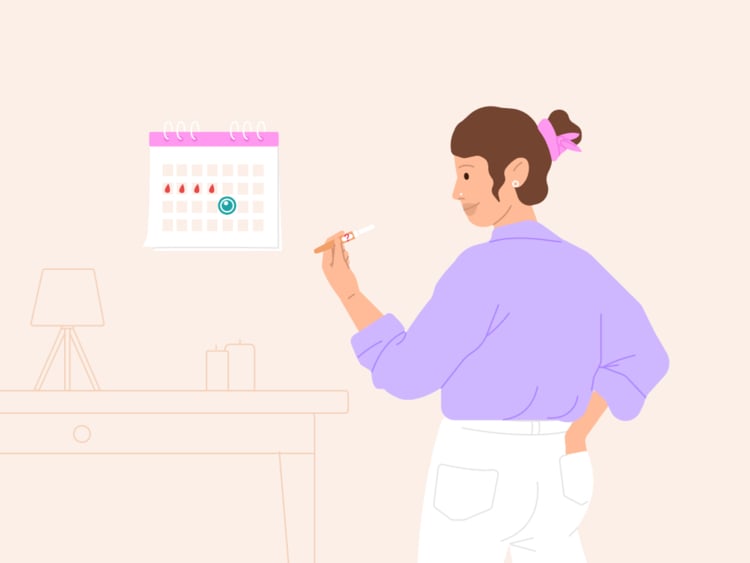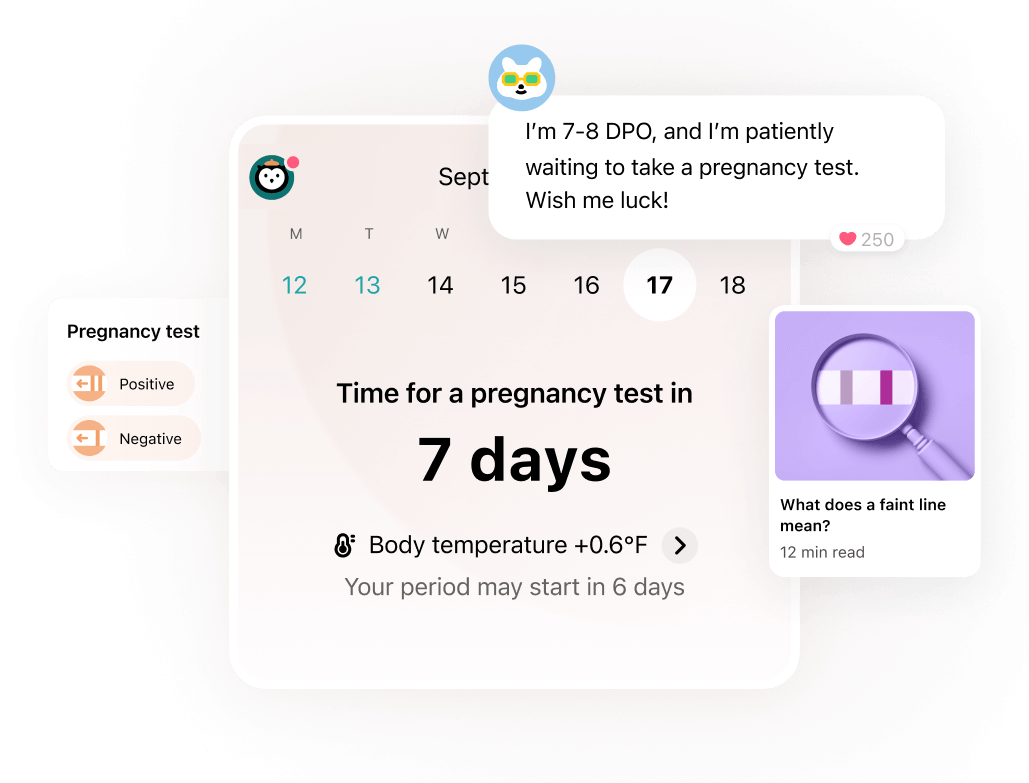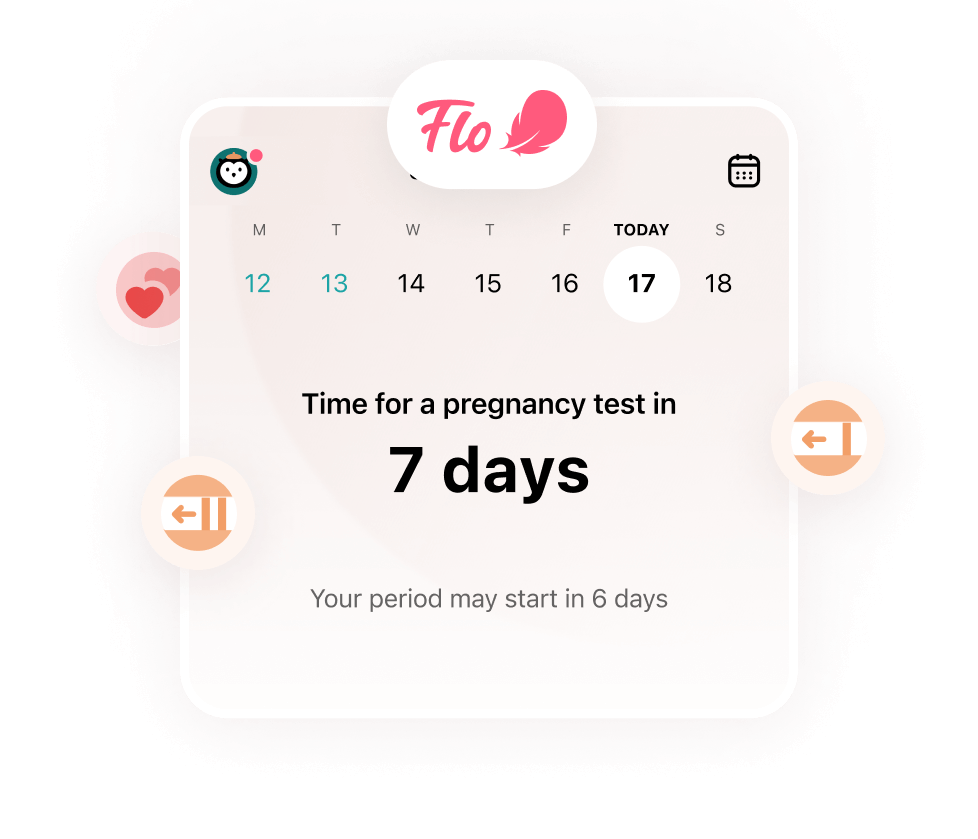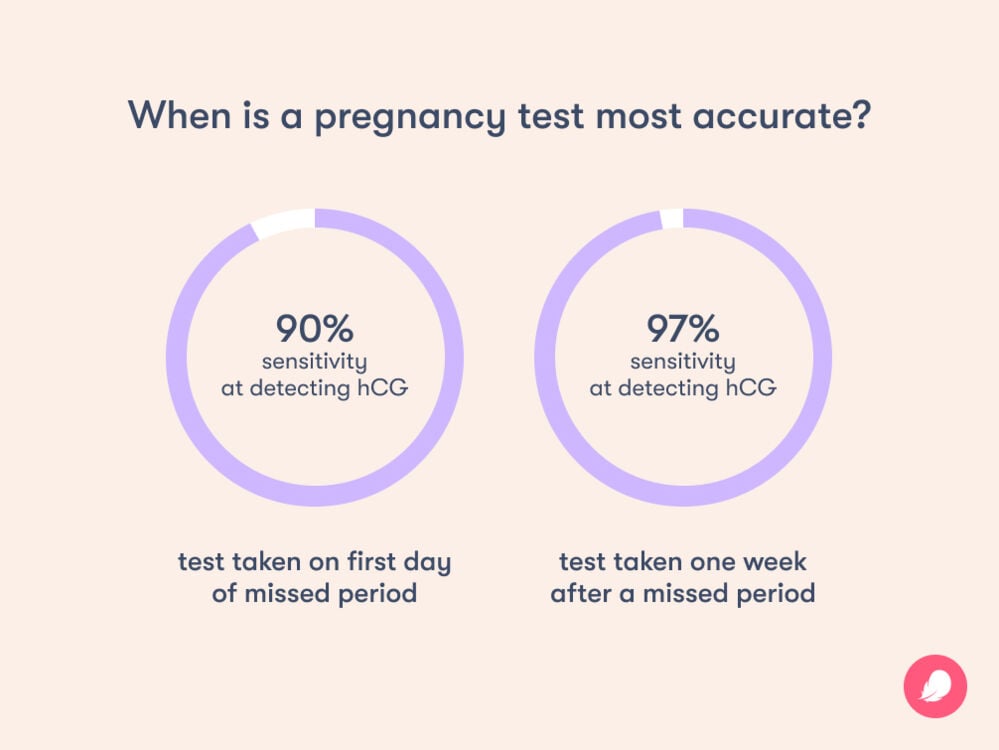Find out how pregnancy tests work and when you can take them for more accurate results.
-
Tracking cycle
-
Getting pregnant
-
Pregnancy
-
Help Center
-
Flo for Partners
-
Anonymous Mode
-
Flo app reviews
-
Flo Premium New
-
Secret Chats New
-
Symptom Checker New
-
Your cycle
-
Health 360°
-
Getting pregnant
-
Pregnancy
-
Being a mom
-
LGBTQ+
-
Quizzes
-
Ovulation calculator
-
hCG calculator
-
Pregnancy test calculator
-
Menstrual cycle calculator
-
Period calculator
-
Implantation calculator
-
Pregnancy weeks to months calculator
-
Pregnancy due date calculator
-
IVF and FET due date calculator
-
Due date calculator by ultrasound
-
Medical Affairs
-
Science & Research
-
Pass It On Project New
-
Privacy Portal
-
Press Center
-
Flo Accuracy
-
Careers
-
Contact Us
How soon after unprotected sex can you test for pregnancy?


Every piece of content at Flo Health adheres to the highest editorial standards for language, style, and medical accuracy. To learn what we do to deliver the best health and lifestyle insights to you, check out our content review principles.
Whether you’re trying to conceive, hoping you haven’t conceived, or somewhere in the middle, waiting and wondering if you might be pregnant is no fun for anyone. You want to know how soon after unprotected sex you can take a test for pregnancy. So let’s get right to it.
We know it’s tempting to run out to your nearest drugstore and pick up a test right away. But testing too early means you could end up with inaccurate results. So what’s the earliest you can test? Why does it matter? And what other things can improve the accuracy of your result?
Key takeaways
- For the most accurate results, the earliest time you should take home pregnancy tests is the first day after a late or missed period.
- Pregnancy tests work by checking your urine for traces of the “pregnancy hormone” human chorionic gonadotropin (hCG). But hCG production takes a little while to get going. So if you test too soon, before hCG has risen to a detectable level yet, you could get a negative result — even though you are actually pregnant.
- There are other things you can do to boost the accuracy of your pregnancy test, too — like doing it in the morning, reading and following the instructions carefully, and making sure it’s not past its expiration date.
- Other signs of early pregnancy, besides a late or missed period, include bloating, tender boobs, and nausea (but bear in mind that pregnancy isn’t the only thing that can cause these symptoms!).
- Flo for Pregnancy is on hand to support you throughout your pregnancy journey.

 Over
7.8M
ratings averaging
4.8/5
*
Over
7.8M
ratings averaging
4.8/5
*
Make sense of pregnancy testing with the Flo app
- Know when it’s the right time to take a test.
- Log results of previous pregnancy tests.
- Chat with others who are trying.
 Over
7.8M
ratings averaging
4.8/5
*
Over
7.8M
ratings averaging
4.8/5
*

Hoping for a positive pregnancy test?
The Flo app can help you on your path to parenthood.

 Over
7.8M
ratings averaging
4.8/5
*
Over
7.8M
ratings averaging
4.8/5
*
Make sense of pregnancy testing with the Flo app
- Know when it’s the right time to take a test.
- Log results of previous pregnancy tests.
- Chat with others who are trying.
What’s the earliest you can take a pregnancy test?
If you’re trying to get pregnant (or, for that matter, if you’re not), it’s natural to want to take a test pronto. But for the most accurate results, then at the earliest, “a pregnancy test should be taken on the first day of your expected or missed period,” says Dr. Jenna Flanagan, assistant professor of obstetrics and gynecology, University of Utah, Utah, US. “If the test is taken too early, it could be a false negative.”
If you’ve been having conception sex during your fertile window — this can be mid-cycle if you have an average 28-day cycle — then you have around a two-week wait until you can find out whether it worked. You’re far from alone if that feels like a lifetime. But it’s worth it to feel more confident about the result.
Take a quiz
Find out what you can do with our Health Assistant
So how do you even know which day your period is due? Enter a period- and ovulation-tracking app like Flo. Simply log your period dates with us each month, and we’ll tell you. Flo can also predict your fertile window and ovulation dates so you know when to have sex in order to maximize your chances if you’re trying.
You can also try Flo’s pregnancy test calculator to understand when a pregnancy test will be most accurate for you based on your cycle.
In the meantime, if you’re feeling anxious while you wait, “exercising, keeping healthy, and focusing on things that calm you can be great ways to keep your mind off it,” says Dr. Flanagan. Think yoga, meditation, or curling up on the sofa with your favorite movie. Whatever feels best for you.
Why do you need to wait to take a pregnancy test?
When you’re pregnant, your body starts producing hCG. Pregnancy tests work by checking your urine or blood for traces of hCG.
But hCG production takes a little while to get going. It starts after implantation, which is when a fertilized egg has attached to the lining of your uterus. This happens around six to 10 days after conception, or when you’re around 3 weeks pregnant. And hCG levels are low at first, but they keep ramping up through early pregnancy.
The long and short of it is that hCG needs a chance to build to a certain point before it will show up on a pregnancy test. “If the test is taken too early, you could get a false negative,” reiterates Dr. Flanagan, “meaning you are actually pregnant, but that hCG hormone just isn’t high enough to be detected yet.”

That’s why it’s recommended to wait until at least the first day of a late or missed period to get more accurate pregnancy test results. And waiting a few days to a week after that — when hCG will have had even more time to build — is even better.
Tips for more accurate pregnancy test results
Many at-home pregnancy tests claim to be more than 99 % accurate when used from the first day of a late period. But these figures are achieved in a lab under “perfect” conditions. A 2019 study found that, when you take real-life settings and human error into account, some pregnancy tests come out as low as 82% accurate.
So how can you ensure that your result is as accurate as possible? Dr. Flanagan gives her top tips.
- Take it, at the earliest, from the first day of a late or missed period. Waiting up to a week after the period was due will boost accuracy even more.
- Always read and follow the instructions that came with your test. Remember, some work differently than others.
- Make sure you leave the test for the specified amount of time before checking it — not more, not less. If you leave it too long, you might see what’s called an evaporation line, which can sometimes be mistaken for a “faint line” positive result.
- Try to take it in the morning, when you’re less likely to be overhydrated. Being overhydrated can dilute the hCG in your urine, potentially rendering it harder to detect.
- Make sure the test is within its expiration date, and if it’s not, get a new one.
If you get a negative pregnancy test, but you think you could still be pregnant, wait a week and then take another test. You can also see your doctor to be sure.
How to spot the early signs of pregnancy
A late or missed period is the most obvious sign of pregnancy. Though there are lots of reasons you can have late or missed periods. As we keep mentioning, this is the point at which you want to take your pregnancy test. But what other signs and symptoms of early pregnancy can you look out for?
“Typically, other symptoms of pregnancy start around six weeks — or two weeks after a positive pregnancy test — as hCG levels rise,” says Dr. Flanagan. “People can experience nausea from that. Then the hormone progesterone also rises, which can cause breasts to become sore and enlarged, as well as gassiness or bloating, and also fatigue.” (So it’s not exactly a party, then.)
One thing to note, though, is that all of these early signs of pregnancy can be a pretty standard part of premenstrual symptoms, too. In other words, the same symptoms can often signal that our periods are just around the corner, which would mean we’re not pregnant at all. That’s why knowing when to take a pregnancy test for an accurate result is so important.
Tracking your cycle is also helpful for this reason. We’re all different, and knowing how you might feel just before your period starts can be super handy. Then, if something feels different one month, and you’re getting symptoms you don’t usually have, it can be easier to recognize.
More frequently asked questions about when to test for pregnancy after unprotected sex
How many days after sex will you know if you’re pregnant?
Some people say they felt pregnant within a week of conception. Others won’t notice anything until weeks later. Either way, you can only know for sure that you’re pregnant once you’ve taken a pregnancy test and gotten a positive result. This can be done from the first day of a late or no-show period.
How soon do pregnancy symptoms start?
As we said, some people say they’ve felt pregnancy symptoms within a week of conception. But for many folks, most symptoms won’t start until they’re around 4 to 6 weeks pregnant. Common symptoms include a missed period, nausea, tender boobs, and fatigue.
How do you know when you’ve conceived?
You wait until the first day of a late or no-show period, and then you take a pregnancy test. Again, some people say they felt pregnant before this — and there might be symptoms — but many of the symptoms of early pregnancy can be caused by a number of things. So the only way to know for sure is to take that test.


Hey, I'm Anique
I started using Flo app to track my period and ovulation because we wanted to have a baby.


The Flo app helped me learn about my body and spot ovulation signs during our conception journey.


I vividly
remember the day
that we switched
Flo into
Pregnancy Mode — it was
such a special
moment.
Real stories, real results
Learn how the Flo app became an amazing cheerleader for us on our conception journey.
References
“5 Things to Remember During the Two Week Wait.” Penn Medicine Lancaster General Health, www.lancastergeneralhealth.org/health-hub-home/motherhood/getting-pregnant/5-things-to-remember-during-the-two-week-wait. Accessed 14 Nov. 2024.
“Am I Pregnant?” Cleveland Clinic, my.clevelandclinic.org/health/articles/9709-pregnancy-am-i-pregnant. Accessed 14 Nov. 2024.
“Amenorrhea: Absence of Periods.” The American College of Obstetricians and Gynecologists, Oct. 2020, www.acog.org/womens-health/faqs/amenorrhea-absence-of-periods.
Boxer, Jackie, et al. “Home Pregnancy Tests in the Hands of the Intended User.” Journal of Immunoassay and Immunochemistry, vol. 40, no. 6, Sep. 2019, pp. 642–52, https://doi.org/10.1080/15321819.2019.1671861.
Gnoth, C., and S. Johnson. “Strips of Hope: Accuracy of Home Pregnancy Tests and New Developments.” Geburtshilfe und Frauenheilkunde, vol. 74, no. 7, July 2014, pp. 661–69, https://doi.org/10.1055/s-0034-1368589.
“Home Pregnancy Tests: Can You Trust the Results?” Mayo Clinic, 23 Dec. 2022, www.mayoclinic.org/healthy-lifestyle/getting-pregnant/in-depth/home-pregnancy-tests/art-20047940.
“Human Chorionic Gonadotropin.” Cleveland Clinic, my.clevelandclinic.org/health/articles/22489-human-chorionic-gonadotropin. Accessed 14 Nov. 2024.
“Menstrual Cycle.” Cleveland Clinic, my.clevelandclinic.org/health/articles/10132-menstrual-cycle. Accessed 14 Nov. 2024.
“Pregnancy Tests.” Cleveland Clinic, my.clevelandclinic.org/health/diagnostics/9703-pregnancy-tests. Accessed 14 Nov. 2024.
“Premenstrual Syndrome (PMS).” The American College of Obstetricians and Gynecologists, May 2021, www.acog.org/womens-health/faqs/premenstrual-syndrome.
“Signs and Symptoms of Pregnancy.” NHS, www.nhs.uk/pregnancy/trying-for-a-baby/signs-and-symptoms-of-pregnancy/. Accessed 15 Nov. 2024.
“Staying Calm in Turbulent Times.” Harvard Health Publishing, 27 Apr. 2020, www.health.harvard.edu/mind-and-mood/staying-calm-in-turbulent-times.
Wilcox, A. J., et al. “Natural Limits of Pregnancy Testing in Relation to the Expected Menstrual Period.” JAMA, vol. 286, no. 14, Oct. 2001, pp. 1759–61, https://doi.org/10.1001/jama.286.14.1759.
“Week 6.” NHS, www.nhs.uk/start-for-life/pregnancy/week-by-week-guide-to-pregnancy/1st-trimester/week-6/. Accessed 14 Nov. 2024.
History of updates
Current version (10 January 2025)
Published (10 January 2025)
In this article

Get your personal guide to fertility
-
Learn how to read your body's ovulation signals
-
Find daily conception tips from our experts
-
Chat with others who are trying to get pregnant




